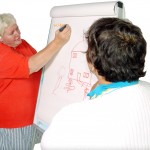
National policy in the UK regarding supporting people with learning disabilities has focused on personalising support, improving social inclusion and the removal of obstacles relating to access to education, employment, healthcare and housing. The authors of the current study suggest that there has been significant progress in these areas, but when looking at the area of relationships and sexuality, that there has been much less progress. A number of studies have shown that for many people with learning disabilities, there continues to be considerable confusion about sexuality and significant gaps in their knowledge
The authors point out that opportunities to participate in relationships and sexuality education can be constrained by attitudes and perceptions of family carers, support workers and professional staff. The current study in Northern Ireland looked at how those barriers might be reduced. The researchers looked at a sample of people drawn from each of the three groups mentioned above. They worked with around 100 people using group and individual interviews.
They found that there was a good deal of agreement about the need for people with learning disabilities to be involved in relationships and sexuality education, but that four barriers to achieving this were consistently mentioned in the responses:
- the need to protect vulnerable persons;
- the lack of training;
- the scarcity of educational resources;
- cultural prohibitions.
The authors suggest that the impact of these barriers could be lessened through partnership working across all groups and the provision of training and information about relationships an sexuality education. They also recommend work on the development of risk management procedures and the further empowerment of people with learning disabilities. For example, respondents to the study assumed that they would be instigating training, rather than responding to requests. People with learning disabilities are not party to the same sources of information as their non-disabled peers and therefore often rely on others to identify and respond to their needs.
The authors suggest that an empowerment strategy may begin to reverse this and that advocacy groups may have a role to play in the provision of training courses for their members and that the use of peer tutors, trained and supported may also help.
They conclude that small practical steps taken by the stakeholders would offer the best way to reach a consensus on relationship and sexuality education for people with learning disabilities and to ensure better practice and provision of such training.
Reducing the barriers to relationships and sexuality education for persons with intellectual disabilities, Laferty A et al., in Journal of Intellectual Disabilities, 16, 1, 29-43
